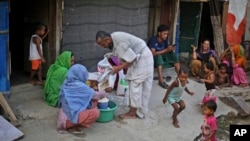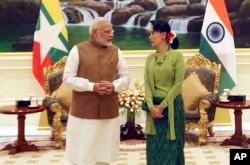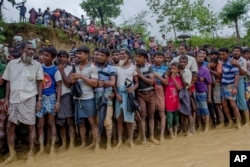India says it has intelligence of links between Rohingya refugees and Pakistan-backed militants inside India, as it justifies plans to deport about 40,000 refugees who entered the country in the past five years.
India is walking a tightrope on the issue of the Rohingya refugees, it has come under scathing criticism from U.N. officials and rights groups for its plans to expel the illegal immigrants at a time when tens of thousands are fleeing alleged persecution in Myanmar.
But calling them a national security threat, New Delhi has indicated that it is in no mood to relent on its plan to identify and deport the refugees.
Finance Minister Arun Jaitley, a top aide of Prime Minister Narendra Modi, said Tuesday that every country has the right to decide on its security policy.
His comment came a day after the government told the Supreme Court that it would confidentially share information from security agencies and other sources "indicating linkages of some of the unauthorized Rohingya immigrants with Pakistan-based terror organizations and similar organizations operating in other countries."
The top court is hearing a petition to stop the government from expelling Rohingya refugees living in the country. The government says the illegal immigrants figure into the plans of Islamic State and Pakistan’s spy agency, the Inter Services Intelligence, to create communal flare-ups in the country.
Indian police also said that on Sunday they arrested a British national, 27-year-old Samiun Rehman, who they said had come to India through Bangladesh to recruit Rohingya to fight for al-Qaida.
Political analysts say the Hindu nationalist government is under pressure from Hindu hardliners to expel the Rohingya, who are Muslims. The call to deport them is loudest in Jammu in northern India, where several thousand have settled.
Manoj Joshi at the Observer Research Foundation in New Delhi asks, “Why the Rohingyas? There is no logic in it.” He says, “In this case, there is no instance, to my knowledge, where some Rohingya has been caught planning terrorist activity against India.”
Scattered through several towns of India, the Rohingya refugees live in squalid conditions and have been appealing not to be deported, pointing out they have nowhere to go.
India’s hardline stand on the Rohingya has been criticized by the United Nations. Deploring its plans to deport the refugees at a time of violence in their country, the U.N. High Commissioner for Human Rights Zeid Ra’ad Al Hussein last week accused India of lacking “basic human compassion.”
New Delhi shot back saying enforcing the laws should not be mistaken for lack of compassion.
India has also been doing a balancing act between its two neighbors on the sensitive issue. It has avoided overt criticism of Myanmar on the issue of Rohingya fleeing from Myanmar to Bangladesh. On a visit to Yangon earlier this month, Modi said New Delhi shared the country’s concerns about “extremist violence” in Rakhine state, from where the ethnic community has been fleeing.
But after Dhaka urged New Delhi to bring more pressure on Myanmar to end the persecution of the ethnic minority, India said it was concerned about the violence. It has also sent relief supplies for the refugees to Bangladesh to underline it is sensitive to the humanitarian concerns created by the mass influx.






